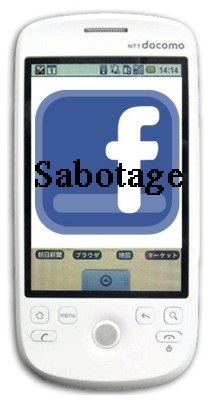Reports have been made that the social network deliberately sabotaged its own application to test user loyalty.
Facebook has now been accused of deliberately crashing its own mobile app as a part of a test of its user patience and loyalty so they can better understand how dedicated people are to the social network.
This isn’t the first time the social media platform has been involved in psychological testing of its users.
The accusation came in the form of a report published in The Information entitled “Facebook’s Android Contingency Planning.” The report stated that the social network was “testing how addicted Android phone users are to Facebook apps and making sure they can quickly download them directly from Facebook rather than through Google Play.” The publication said their source was an individual who was familiar with that specific experiment.
The suggestion in the report was that plans were being made in case the mobile app was taken down from Google Play.
 Within the report, it said that “artificial errors” were deliberately introduced into the smartphone application which would cause it to crash “for hours at a time.” It claimed that the reason the test was being conducted was in order to “prepar[e] for the eventuality that it leaves the Google Play app store.”
Within the report, it said that “artificial errors” were deliberately introduced into the smartphone application which would cause it to crash “for hours at a time.” It claimed that the reason the test was being conducted was in order to “prepar[e] for the eventuality that it leaves the Google Play app store.”
As a part of this, the social network deliberately crashed their mobile application for some of its users, off-and-on, over a span of a number of weeks. The goal was to measure whether or not those individuals would prefer to visit the mobile website or whether they would simply give up on using Facebook. What they found was that users were, indeed, willing to use the mobile site instead of abandoning their use of that social network.
Allegedly, this entire psychological experiment on Facebook users was to find out whether or not users were addicted enough to the social network that they would continue to use the platform even if the mobile app were to face difficulties or even be removed from the Google Play Store. At the time of the writing of this article, Facebook had not yet made any official statements with regards to this accusation.
At the same time, the top social media platform has gone ahead and shut down Creative Labs.
The initiative that was behind a range of the most experimental Facebook apps published by the social network – as well as a number of the applications it put out over the last year – have all been shut down and are no longer available for download.
Some of the mobile apps no longer available include Riff, Rooms and Slingshot, which were essentially failures.
Each of those Facebook apps were unpopular and were considered to have missed the mark in terms of what mobile device users actually want. According to the social network, it still intends to encourage experimentation. However, that will not be through Creative Labs, a type of initiative somewhat like a startup, which was quietly closed down. As of December 7, the Riff, Rooms and Slingshot apps were taken down from the app stores where they had previously been available. Moreover, the webpage for Creative Labs has also been taken down.
According to a spokesperson, the Facebook apps hadn’t received any updates in quite some time.
 The spokeswoman explained that “Since their launches, we’ve incorporated elements of Slingshot, Riff and Rooms into the Facebook for iOS and Android apps.”
The spokeswoman explained that “Since their launches, we’ve incorporated elements of Slingshot, Riff and Rooms into the Facebook for iOS and Android apps.”
The social network is known for its inclination to continually “move fast and break things.” This time, it determined that some of the efforts it had made under that mantra hadn’t worked out, so it was bringing them to an end. This could potentially mark an important milestone in the development of applications under the Facebook brand, as the company turns its attention on other creative avenues.
For instance, it is still looking toward artificial intelligence (AI) technology, as well as drones that would be able to bring internet connections to highly remote parts of the world, in addition to virtual reality (VR) goggles. While the company had been continually adding new Facebook apps to offer new components of the desktop version of its service as well as to compete with other popular application offerings, it has been gradually turning toward boosting the features of its core platform, including the 360 degree videos and live streaming.
 Within the report, it said that “artificial errors” were deliberately introduced into the smartphone application which would cause it to crash “for hours at a time.” It claimed that the reason the test was being conducted was in order to “prepar[e] for the eventuality that it leaves the Google Play app store.”
Within the report, it said that “artificial errors” were deliberately introduced into the smartphone application which would cause it to crash “for hours at a time.” It claimed that the reason the test was being conducted was in order to “prepar[e] for the eventuality that it leaves the Google Play app store.”
 The spokeswoman explained that “Since their launches, we’ve incorporated elements of Slingshot, Riff and Rooms into the Facebook for iOS and Android apps.”
The spokeswoman explained that “Since their launches, we’ve incorporated elements of Slingshot, Riff and Rooms into the Facebook for iOS and Android apps.”